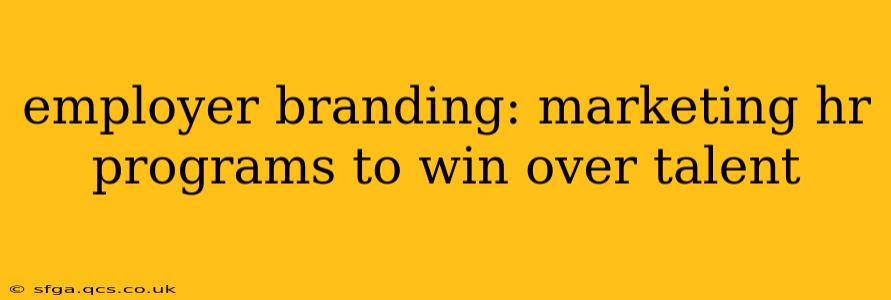In today's competitive job market, attracting and retaining top talent is crucial for any organization's success. Employer branding is no longer a "nice-to-have" but a necessity. It's about crafting a compelling narrative that showcases your company culture, values, and employee experience, effectively marketing your HR programs to prospective and current employees. This isn't just about posting job openings; it's about building a reputation as an employer of choice. This comprehensive guide will explore the strategies and tactics necessary to build a powerful employer brand and leverage HR programs to attract and retain the best talent.
What is Employer Branding?
Employer branding is the process of creating a positive and consistent perception of your company as an employer. It's about defining what makes your company unique and desirable to work for, and then communicating that message effectively to your target audience. Think of it as marketing your company to potential employees, not just for your products or services. It involves understanding your employee value proposition (EVP), which is the unique combination of compensation, benefits, and work environment that you offer. A strong EVP is the foundation of a successful employer branding strategy.
How Does Employer Branding Benefit My Company?
The benefits of a strong employer branding strategy are numerous and impactful:
- Attracts Top Talent: A compelling employer brand attracts high-quality candidates who align with your company culture and values.
- Reduces Recruitment Costs: By attracting qualified candidates, you reduce the time and resources spent on recruitment.
- Improves Employee Retention: Employees are more likely to stay with a company they are proud to be associated with.
- Enhances Company Reputation: A strong employer brand improves your overall reputation and builds trust with stakeholders.
- Boosts Employee Engagement: Employees are more engaged when they feel valued and appreciated, leading to increased productivity and innovation.
Marketing HR Programs to Attract Talent: Key Strategies
Effective employer branding involves strategically marketing your HR programs to highlight their value. Here are some key strategies:
1. Define Your Employee Value Proposition (EVP):
Before you start marketing, clearly define what makes your company a great place to work. What are your unique benefits? What is your company culture like? What opportunities for growth do you offer? This EVP forms the core message of your employer branding efforts.
2. Leverage Social Media:
Social media platforms like LinkedIn, Instagram, and Twitter are powerful tools for employer branding. Share employee stories, behind-the-scenes glimpses into your company culture, and highlight your HR programs. Use engaging visuals and videos to showcase your company's personality.
3. Create Engaging Content:
Develop compelling content that showcases your company culture, values, and employee experiences. This can include blog posts, articles, videos, infographics, and case studies. Highlight employee testimonials and success stories.
4. Optimize Your Career Website:
Your career website is often the first impression potential candidates have of your company. Make sure it's easy to navigate, visually appealing, and showcases your employer brand. Include information about your company culture, values, benefits, and open positions.
5. Employee Advocacy:
Encourage your current employees to become brand ambassadors. Empower them to share their positive experiences on social media and with their networks.
Frequently Asked Questions (PAAs) about Employer Branding
Here are some common questions surrounding employer branding and effective HR program marketing, addressed to give you a deeper understanding:
What are some examples of successful employer branding campaigns?
Many companies have executed successful employer branding campaigns. Look at companies known for their strong cultures and positive employee experiences. They often highlight employee well-being, professional development opportunities, and unique benefits to attract top talent. Research successful campaigns and see what resonated with their target audience. Analyzing these examples can help you tailor your strategy for your own organization.
How do I measure the success of my employer branding efforts?
Measuring the success of your employer branding initiatives requires tracking key metrics. These include:
- Application rates: Has the quality and quantity of applications increased?
- Time-to-hire: Has the time it takes to fill open positions decreased?
- Employee retention rate: Has employee turnover decreased?
- Social media engagement: Are your employer branding posts generating likes, shares, and comments?
- Candidate feedback: What are candidates saying about your company during the interview process?
- Employee satisfaction surveys: How satisfied are your employees with their work experience?
By monitoring these metrics, you can assess the effectiveness of your employer branding strategy and make adjustments as needed.
How can I ensure my employer branding is authentic?
Authenticity is paramount in employer branding. Don't try to create a false image of your company. Focus on showcasing your true culture, values, and employee experiences. Be transparent about both the positive and negative aspects of working at your company. Authenticity builds trust and attracts candidates who are a good fit for your organization.
How can I integrate my employer branding efforts with my overall marketing strategy?
Employer branding should be integrated into your overall marketing strategy. Consider how you can align your employer brand messaging with your product or service marketing. For example, you might feature employee testimonials in your advertising campaigns or highlight employee stories on your website. Consistency in messaging across all channels is crucial for building a strong and cohesive employer brand.
By effectively implementing these strategies and addressing common concerns, you can successfully market your HR programs, strengthening your employer brand, and ultimately attracting and retaining the best talent. Remember that employer branding is an ongoing process requiring continuous effort and adaptation.
